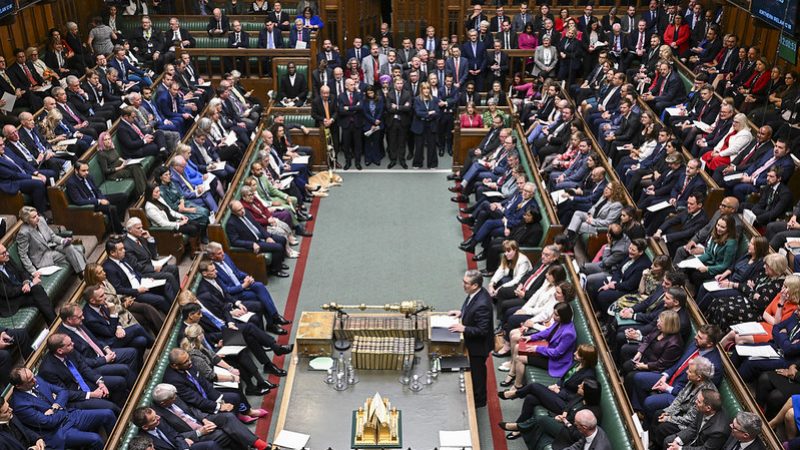
MPs have increasingly become ‘super councillors’ as opposed to legislators.
In practice this means MPs are expected to address issues that are within the control of councillors. This not only stretches the role of MPs too thinly over too many responsibilities, but also creates increasing ambiguity for the public about who is responsible for what.
By empowering mayors and councillors, MPs can regain focus on their role as UK legislators. Devolution – and the English Devolution and Community Empowerment Bill currently working its way through Parliament – is a chance to make this change.
READ MORE: ‘A small tax with big potential – let the mayors tax tourists’
There are many reasons why MPs have become dubbed ‘super councillors’. The media is less interested in the scrutiny of legislation that it was in the past which switches attentions to more local issues. MPs teams are squeezed and can lack legislative expertise. Meanwhile, the financial erosion of local government paired with a seemingly insatiable appetite of successive governments to have centrally held pothole funds have exacerbated the trend. It’s no wonder the public think that scrutinising legislation should be low down in the prioritisation of MP’s time, according to polling by the Hansard Society.
This is not a sustainable situation. One Labour MP I spoke to recently estimated that 70% of the casework he received was from people who need their local council to act, including on parking, planning or bin collections. In turn, MPs then need to turn to councillors and the council for a response. And this can delay action and communication, frustrating the public at a time when trust in politics couldn’t be much lower. As well as, no doubt, frustrating the overstretched MPs’ offices.
This is where devolution can help.
As the role of mayor is drawn with increasing depth and the role of councillors is refined by unitarisation, there is an opportunity for MPs to redraw their roles too. Mayors and councillors must be empowered and sufficiently financially supported so that MPs can regain the role of UK legislators. Coupled with some much-needed communication and education of the public on the differences between these roles, this clarification and simplification would benefit our legislators and public alike.
MPs should no longer have to be all things to all people. Instead, they should be able to represent the interests of their constituents by delivering on their core roles of parliamentary scrutiny, debate, policy making and legislating.
Subscribe here to our daily newsletter roundup of Labour news, analysis and comment– and follow us on Bluesky, WhatsApp, X and Facebook.
Of course, being a super councillor MP understandably has its attractions. In a political environment where there is a pressure to be a hyperlocal champion it is easy enough to understand the draw and incentive of such a local focus of our MPs. But what if the local focus of MPs was instead consulting and understanding the views of their constituents on national issues such as tax changes and the NHS? Which they can then work in Parliament to directly influence through debate, scrutiny and law-making.
Local government is quite rightly the first formal foray into politics for many of our MPs. This is the case for over 100 new MPs who won their seat for the first time in July 2024. So it’s understandable that having seen the world through the eyes of being a local councillor, it’s hard to let the more local, tangible issues be dealt with by others. But to choose to be an MP is to choose to be a legislator. Those who best enjoy dealing with hyperlocal issues could stay in the other privileged role of being a direct local champion and councillor.
Devolution presents an opportunity for MPs to do their roles as intended and to stop trying to be all things to all people. Let’s empower mayors and councillors in their positions through devolution – and MPs in theirs as UK legislators. Perhaps then the political system can work better for the people, collectively, they are all trying to serve.
Share your thoughts. Contribute on this story or tell your own by writing to our Editor. The best letters every week will be published on the site. Find out how to get your letter published.
-
- SHARE: If you have anything to share that we should be looking into or publishing about this story – or any other topic involving Labour– contact us (strictly anonymously if you wish) at [email protected].
- SUBSCRIBE: Sign up to LabourList’s morning email here for the best briefing on everything Labour, every weekday morning.
- DONATE: If you value our work, please chip in a few pounds a week and become one of our supporters, helping sustain and expand our coverage.
- PARTNER: If you or your organisation might be interested in partnering with us on sponsored events or projects, email [email protected].
- ADVERTISE: If your organisation would like to advertise or run sponsored pieces on LabourList‘s daily newsletter or website, contact our exclusive ad partners Total Politics at [email protected].




More from LabourList
‘Labour won’t stop the far right by changing leaders — only by proving what the left can deliver’
‘Cutting Welsh university funding would be economic vandalism, not reform’
Sadiq Khan signals he will stand for a fourth term as London Mayor